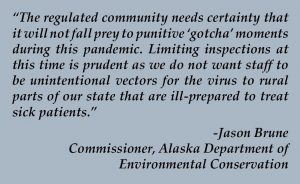
By Donna Schantz
Executive Director
In March, the U.S. Environmental Protection Agency issued a temporary policy on how to handle enforcement and compliance during the COVID-19 pandemic. An April letter clarified that the policy was not intended to absolve companies of responsibility, but to allow flexibility for regulators to adapt to the unique situations presented by the pandemic.
The EPA published remarks from public officials and stakeholders in support of the temporary policy, including remarks from Jason Brune, the commissioner of the Alaska Department of Environmental Conservation, or ADEC. The commissioner’s remarks are concerning, especially the reference to regulatory bodies, including ADEC and other state and federal agencies, seeking out “gotcha” moments in the course of their duty to enforce safety requirements.
In an April 24 letter to ADEC, the Council requested a commitment that all reasonable actions to prevent accidents from occurring would be taken. The Council also requested that any temporary policies such as this one be lifted as soon as the emergency declaration has ended.
Inspections are not ‘gotcha’ moments
The Council does not believe that regulatory oversight, including monitoring, inspecting, and reporting on industry operations, are punitive ‘gotcha’ moments. We also do not think that regulatory bodies seek to unnecessarily penalize industry during normal circumstances, let alone during an emergency such as the COVID-19 pandemic.

Given the extreme stresses resulting from this crisis, careful consideration should be given to how issues are characterized. The Council recognizes that regulators’ discretion is necessary during these unprecedented times, however regulatory enforcement must continue, as clarified by the EPA in April.
As state and federal agencies are stretched to their maximum capabilities, the Council’s role becomes increasingly more important. These new limits on inspections are added to the many stressors already impacting the system in Prince William Sound, such as complications related to the pandemic, the recent oil spill from the Valdez Marine Terminal, the low price of oil, and reduced budgets and staffing levels, all of which could result in diminished safeguards for oil spill prevention and response. The suggestion that the department is limiting inspections can lead to complacency for both industry and regulatory agencies, transferring the risk to the public, and increasing the possibility of a major oil spill.
The safety of personnel must be the first priority. However, regulatory agencies cannot back off from their oil spill prevention responsibilities at this critical time in Alaska’s history.
Link to ADEC guidance: COVID-19 caused Non-Compliance Concerns, No Action Assurance Memorandum